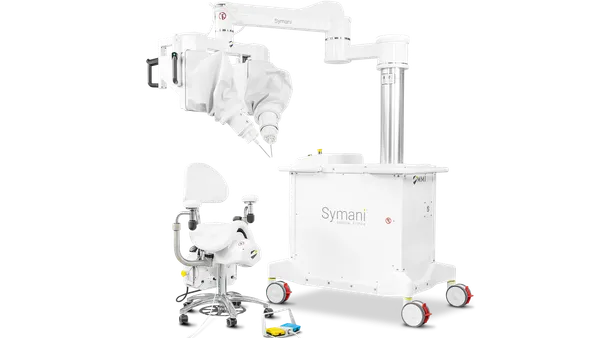Dive Brief:
- The rate of structural valve deterioration at five years with open heart surgery (SAVR) was 4.38% versus 2.57% in patients undergoing Medtronic's supra-annular, self-expanding transcatheter aortic valve replacement (TAVR), according to a pooled analysis that was presented on Monday at the American College of Cardiology's Scientific Sessions.
- Investigators in their analysis of 2,099 patients compared rates of structural valve deterioration with TAVR and SAVR using two randomized controlled trials, the CoreValve US High-Risk Pivotal Trial and the Surgical Replacement and Transcatheter Aortic Valve Implantation (SURTAVI) trial. They also included 2,663 patients from the CoreValve US Extreme-Risk Study and CoreValve Continued Access Study to determine the relationship between clinical outcomes and structural valve deterioration.
- Michale Reardon, the study's senior author, said in an ACC post that "the study is the largest to assess SVD in patients who participated in randomized trials comparing TAVR and SAVR and the first to show less structural valve deterioration after five years among patients treated with TAVR compared with SAVR." Stifel analysts said in a note that the results will help Medtronic but "should also benefit all TAVR companies."
Dive Insight:
Previous studies have demonstrated either higher or similar rates of structural valve deterioration for TAVR compared to open-heart surgery. However, J.P. Morgan analysts wrote that Medtronic's CoreValve Evolut is now the only transcatheter valve to demonstrate lower rates compared to surgery in randomized clinical trials, bolstering the company's clinical case for using its TAVR devices rather than surgery, with the presentation of the pooled analysis at this year's ACC Scientific Sessions.
"As TAVR is being used among a wider patient population, valve durability is becoming more important to clinicians when selecting a treatment option. Patients need a valve that can accommodate their activity levels while remaining hemodynamically stable for years to come," Reardon, who is also a professor of cardiothoracic surgery and Allison Family Distinguished Chair of Cardiovascular Research at Houston Methodist DeBakey Heart & Vascular Center, said in a written statement.
Medtronic in November at the Transcatheter Cardiovascular Therapeutics conference presented five-year data from the SURTAVI trial, which randomized 1,746 patients with intermediate surgical risk for treatment with one of the company's TAVR devices. The five-year analysis confirmed the findings of the earlier readout, with the rate of all-cause mortality or disabling stroke in the TAVR group, 31.3%, being almost identical to that of the surgery cohort, 30.8%.
In the pooled analysis presented at ACC, structural valve deterioration was associated with worsened clinical outcomes, with a composite rate of all-cause mortality or hospitalization for aortic valve disease or worsening heart failure of 2.73% for the surgery group and 1.93% for the TAVR group.
The analysis also showed a higher risk of developing structural valve deterioration in younger patients, women, and patients with a higher body surface area.
"Heart surgeons tend to worry that in younger, lower-risk patients, replacement valves inserted using TAVR may fail more quickly than surgically inserted valves," Reardon said. "The results of this study suggest exactly the opposite – that at five years, the TAVR-inserted valve has less structural deterioration than the surgically inserted one."
"As surgical valve deterioration accelerates over time, panelists noted that the differences between the transcatheter and surgical outcomes will likely widen over time, which points to the long-term benefits of CoreValve Evolut and calls into question the long-standing belief that SAVR is the better option for younger patients due to its durability," J.P. Morgan analysts wrote in a Monday note.
Still, as clinicians debate durability and patient suitability, Stifel analysts contend the analysis "augurs well" for TAVR utilization in general.
"We think these positive durability results for Medtronic CoreValve are likely to be a highly-positive talking point for the Medtronic sales team but should also benefit all TAVR companies broadly," the analysts wrote.









